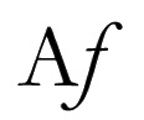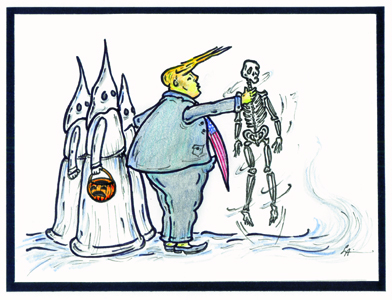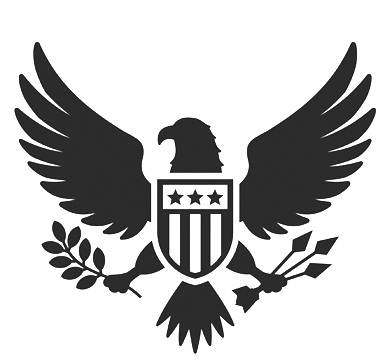Editor’s Notebook © by John Arkelian
The best of writing, photography, art, and argument – on everything from film to foreign policy.
“Ever dreamed of subscribing to a cultural magazine that doesn’t seem to be eating out of the hand of half a dozen media magnates? Something pluricultural and unassuming but nonetheless covering everything worth seeing, reading, doing or listening to for a season? Well, it exists, and in Canada to boot!”
“There is no on-line version or web site, which either makes John a dinosaur or a man of character. (I opt for the second, since the editorial team occasionally has a kind word for me.)”
John Howe — Canadian artist and co-conceptual designer on all three “The Lord of the Rings” motion pictures.
* Editor’s Note: The age of the dinosaurs has at last come to an end — with the arrival of this website!
|
On February 9, 2021
© By John Arkelian
“One nation, indivisible.” Those words, well-known to every American child from the Pledge of Allegiance recited at the start of every school-day, have currency on the northern side of the 49th Parallel, too, even though they too often go unspoken here. Recurring talk over the years about separatism in Quebec perversely takes it for granted that sovereign independence is theirs for the taking. It assumes that circumstances can exist under which a provincial government can take a province out of Canada. In short, it recognizes a “right” to secede. But, we are making a crucial and wholly unwarranted concession to those who would break up the country when we tacitly accept that any province has a right to secession. For no such right exists.
See “The Noxious Idea of Separation” at https://artsforum.ca/ideas/regional-perspectives
On February 9, 2021
© By John Arkelian
An organized society, or ‘polity,’ is made up of innumerable interactions among individual persons – and between each of us and the myriad of laws, norms, policies, and practices that govern the ways we navigate our way through daily life. Never mind the overrated internet; the real ‘world-wide web’ is the profuse, intricate network of connections between people, regulatory bodies, and commercial enterprises – among other entities, like religious, cultural, educational, recreational, and volunteer-driven community service organizations. Aristotle said “Man is by nature a political animal” (or, more literally, “an animal which lives in cities”). The ideal polity is one in which we respect each others’ rights, live by mutually agreed rules, and are governed with our consent. In a very real sense, the polity is us, and we should be ever mindful of ways to make it more just, more amenable to the attainment of the full potential of each of its members, and more conducive to their general welfare. Perfecting a polity is a perpetual work in progress. And, we still have a lot of work to do.
Consider examples from the realms of representative government; constitutional reform; individual freedoms; the regulation of commerce; strengthening consumer protection; repairing a broken legal system; practicing a foreign policy that truly reflects our shared values; and addressing cultural conundrums like those governing our approach to minority communities.
See “The Polity and Us” at https://artsforum.ca/ideas/regional-perspectives
On February 9, 2021
© By John Arkelian
How we see, understand, and interact with the world says a great deal about us – as individuals and as nations. In the realm of political affairs, principle has long taken a distant backseat to power politics. The term of art for that approach is “realpolitik.” It predicates policy and action based on practical objectives rather than abstract principles. Its adherents scoff at treating ideals as the basis for national policy, in the domestic or foreign sphere, and instead claim a dubious pride in dealing with the world as it actually is, rather than as it ought to be. In truth, realpolitik is the dominant organizing principle for human political affairs. But, must it ever be so?
The answer is no. There is another way, a way based upon shared moral responsibility and the eminently practical consideration that no man is free unless and until all men are free. Václav Havel, Czechoslovakia’s playwright and dissident turned first post-communist president, said it best: “One can imagine a foreign policy… that demonstrably does not merely pursue the selfish interests of a country, but instead displays a feeling of common responsibility for the fate of all human society, its freedom, its plurality, and its life in peace.” Accepting a shared moral responsibility for the world means rejecting the notion that one nation (or group of nations) can be free, prosperous, and secure while others are deprived of those secular blessings.
See “Making Room for Moral Responsibility” at: https://artsforum.ca/ideas/the-wide-world
Artsforum Magazine is all about communicating ideas
 © 2000 Artsforum Magazine – in North
America and around the world. And we couldn’t do it without the able, generous support in recent years of the first-rate telecom providers known as telMAX and Nexicom. We recommend them to our readers for your consideration:
Nexicom: http://www.nexicom.net/
telMAX: https://www.telmax.com/
On September 14, 2020
© By John Arkelian
Politics and the law don’t mix. In the Free World, the law preserves and enlarges our freedom by guaranteeing equal protection to all.
 Keeping a firm grip on the electorate – copyright © 2020 by Linda Arkelian Rich or poor, powerful or meek, mainstream or minority, we are all equal before the law. An inviolable, impartial guardian, the law must stand above partisanship, favoritism, and calculations of either political or private advantage. When politics and law collide, the rule of law is threatened and the chief guarantor of our freedom is undermined. Yet, precisely such headlong collisions – between a self-serving ‘irresistible force’ and our protective ‘immoveable object’ – have been coming fast and furious in the past couple of years. Consider the alarming recent examples from Canada and the United States discussed in “When Politics and Law Collide” at: https://artsforum.ca/ideas/regional-perspectives
On July 13, 2020
© By John Arkelian
“The United States of America was founded on great ideals – of liberal democracy, individual liberty, equality before the law,
 Image courtesy of VectorStock © 2020 inalienable human rights, and governance that is truly of, by, and for the people. In practice, however, those great founding principles have sometimes been neglected, tarnished, unduly compromised, and even actively undermined by aims and actions that are unworthy of the Great Republic. The narrow, selfish interests of the few too often trump the common welfare of the many; when money taints politics, profit outranks principle. Core human rights are sacrificed on the unholy altar of an illusory security from those who would harm us. Wretched tyrannies are embraced as ‘allies’ when we should regard them as repugnant foes of freedom….
Democrat and Republican. How different are they, really? Both seem to neglect the 99% in favor of the narrow interests of one-percenters. Maybe they are just a good-cop, bad-cop tag team, an unholy pairing that gives us the illusion of choice, when, beneath the rhetorical ‘differences,’ each of those parties is one-half of a single Janus-faced party of the status quo…
An idealist, by contrast, is one who cherishes all high, noble principles (rather than a narrow ideology), one who dares to dream of what has never been and to ask, “Why not?” 2020 is a presidential election year in the United States. If there ever was a time to ask, ‘Why not?’ and ‘What if?’ this is it. If an idealist were president, he (or she) would be guided in all things by the great ideals upon which the nation (and indeed, the Free World) was founded…”
Wonder what idealism in practice might mean for American foreign and domestic policy? Read our essay “If An Idealist Ran the White House” at: https://artsforum.ca/ideas/the-wide-world
Copyright © 2020 by John Arkelian.
Image courtesy of VectorStock at: https://www.vectorstock.com/
|



